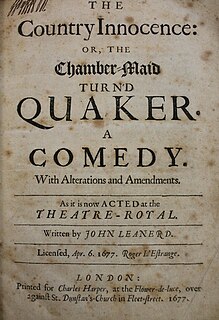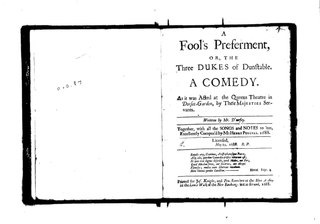Related Research Articles

Epsom Wells is a 1672 restoration comedy by the English writer Thomas Shadwell. It was the first in a line of plays set in spa towns. The incidental music was composed by Nicholas Staggins. In the 1690s Henry Purcell scored a new staging of the play. It was performed at the Dorset Garden Theatre by the Duke's Company. The cast included Henry Harris as Rains, Thomas Betterton as Bevil, William Smith as Woodly, Cave Underhill as Justice Clodpate, Anne Gibbs as Lucia, Mary Betterton as Mrs Jilt, James Nokes as Bisket and Edward Angel as Fribble.
Philip Cademan was an English stage actor of the Restoration era.
The Careless Lovers is a 1673 comedy play by the English writer Edward Ravenscroft. Staged at the Dorset Garden Theatre by the Duke's Company the original cast included Henry Norris as Mr Machworth, Philip Cademan as Mr Lovell, William Smith as Mr Careless, Edward Angel as De Boastado, Margaret Osborne as Mrs Clappam and Elinor Leigh as Beatrice.
The London Cuckolds is a 1681 comedy play by the English writer Edward Ravenscroft.

Dame Dobson is a 1683 comedy play by the English writer Edward Ravenscroft.
Love For Money; Or, The Boarding School is a 1691 comedy play by the English writer Thomas D'Urfey. It was originally staged at the Theatre Royal, Drury Lane by the United Company. In 1733 it was adapted into a ballad opera The Boarding School by Charles Coffey.

Don Sebastian, King Of Portugal is a 1689 tragedy by the English writer John Dryden. It is based on the reign of Sebastian of Portugal leading up to his defeat and death at the Battle of Alcácer Quibir in 1578. An Elizabethan play The Battle of Alcazar also portrays the events.

The Wives Excuse also The Wives Excuse; Or, Cuckolds Make Themselves is a 1691 comedy play by the Anglo-Irish writer Thomas Southerne. The title is sometimes written more grammatically as The Wives' Excuse.

Henry Harris was an English stage actor and theatre manager. Initially a painter he was a founder member of the new Duke's Company in 1660 following the Restoration which established itself at the old Salisbury Court Theatre before moving to the new Lincoln's Inn Fields Theatre shortly afterwards. Due to his background Harris may have been a set designer and painter during his early years with the company. However, by 1661 he was acting, and his first recorded role was in William Davenant's The Siege of Rhodes that summer. He quickly established himself as the second actor in the troupe after Thomas Betterton.
John Crosby was an English stage actor of the Restoration Period. He first recorded performance is in 1662 when he appeared in Ignoramus at Whitehall Palace, likely as a child actor. It was further eight years before he was solidly established in the Duke's Company in 1670 beginning with The Forc'd Marriage by Aphra Behn. He became a regular with the company over the following decade, often playing young lover roles. He retired from the stage in 1679 and later became a justice of the peace for Middlesex. He died on 8 April 1724 and was buried in St Sepulchre.
The Woman Captain; Or, The Usurer Turned Soldier is a 1679 comedy by the English writer Thomas Shadwell. It was originally staged by the Duke's Company at Dorset Garden Theatre in London. The original cast is unknown except for Elizabeth Barry who played the title role, and also read the epilogue. It is part of the tradition of Restoration Comedy that flourished during the era.
The English Frier; Or, The Town Sparks, sometimes spelt as The English Friar, is a 1690 comedy play by the English writer John Crowne. It was originally staged by the United Company most likely at the Theatre Royal, Drury Lane, although it may have appeared at the Dorset Garden Theatre, the other venue of the company. Written in context of the recent Glorious Revolution, it attacks Catholic priests who meddle in English politics, undermining the constitution.

The Fortune Hunters; Or, Two Fools Well Met is 1689 comedy play by James Carlile. It was originally staged by the United Company at the Theatre Royal, Drury Lane in London.

Love Triumphant; Or, Nature Will Prevail is a 1694 tragicomedy by the English writer John Dryden. It was Dryden's final stage play.

The Country Innocence; Or, The Chamber-maid Turn'd Quaker is a 1677 comedy play by the English writer John Leanerd. It was originally performed by the King's Company at the Theatre Royal, Drury Lane in London. It borrowed very heavily from the 1647 work The Countrie Girl by Thomas Brewer.

Love In The Dark; Or, The Man of Bus'ness is a 1675 comedy play by the English writer Francis Fane. It was first staged by the King's Company at the Theatre Royal, Drury Lane in London. The epilogue was written by the Earl of Rochester, and may also have contributed some of the more libertine lines to the play. It is set in Venice.

A Fool's Preferment; Or, The Three Dukes Of Dunstable is a 1688 comedy play by the English writer Thomas D'Urfey. It is a reworking of John Fletcher's Jacobean work The Noble Gentleman. It was first performed by the United Company at the Dorset Garden Theatre in London. Henry Purcell composed the play's incidental music. It was his first major work composingfor the theatre in seven years since Sir Barnaby Whigg.

Love in a Wood; Or, St James's Park is a 1671 comedy play by the English writer William Wycherley. His debut play, it was first staged at the Theatre Royal, Drury Lane by the King's Company.

Tom Essence; Or, The Modish Wife is a 1676 comedy play by Thomas Rawlins, sometimes also attributed to Edward Ravenscroft. It was first performed at the Dorset Garden Theatre in London by the Duke's Company. Along with Thomas Otway's The Soldier's Fortune it incorporated scenes from Moliere's The Imaginary Cuckold in an otherwise unrelated plot.

Tunbridge Wells; Or, A Day's Courtship is a 1678 comedy play generally attributed to the English writer Thomas Rawlins. It was originally staged at the Dorset Garden Theatre in London by the Duke's Company. The names of the original actors are not known. It did not enjoy the same success as Rawlins' earlier work Tom Essence.
References
- ↑ Van Lennep p.195